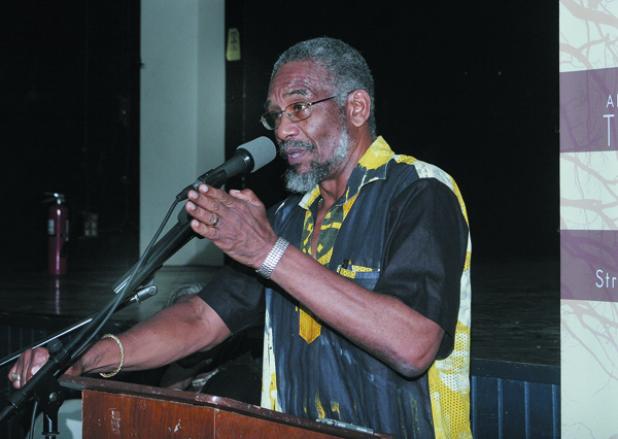
Rawle Gibbons speaking on ‘The Notion of Identity in the Creation of a National Theatre’ recently at the Queen’s Park Steel Shed.
‘The Tempest’ reflects Caribbean islands’ history
‘THE Tempest,’ a play written by British Play Writer, William Shakespeare, is one that reflects the history of these islands.
This is according to Caribbean Writer, Dramatist and Senior Lecturer in the Creative Arts Centre at the University of the West Indies (UWI), St. Augustine Campus, Rawle Gibbons, who spoke at the inaugural Guy Goring Memorial Lecture, on ‘The Notion of Identity in the Creation of a National Theatre’, recently at the Queen’s Park Steel Shed.
He said that it starts off with the destruction of the original inhabitants, who were destroyed within 30 years after the Europeans landed on these islands.
“Within 30 years of the discovery, two million people who had occupied this space had been dissented – within 30 years. So that island that Caliban describes was a nostalgic past for the original inhabitants.”
However, the Europeans would become rich as a result of the development of various cities, and the creation of different industries and businesses, while on the other hand, it would only lead to the hardships of another group of inhabitants, those who would be brought to these islands later on by the Europeans, in a scenario of trials and tribulations, of which none were seen before and none were to be seen since.
“But the promise of gold, of riches dropping, became very real for the prospers of Europe who enterprised the island, of course with cities, industries, businesses, and from then until now, indeed it was a source of great riches. For the other would be inhabitants within that century, who would have been brought to this country, the islands would have been a scene of suffering and of a wretchedness, not seen before in history nor since.”
However, this did not spell the end of these new inhabitants, as it did for the original inhabitants, as their strong spirit would ensure that they survived, just as how in the play, Caliban never gives up.
“These are the islands and this is the cast. When Prospero leaves the island at the end of the day, he goes back to his love of the land... and Caliban is left to re-inherit the island. But Caliban, the monster as he is called, is a part of the true spirit of the new Caribbean population. He is a true Creole, and by that I mean that he is in a state of metamorphosis. He has Prospero’s language, so he has been creolised.”
Indeed, the character of Caliban is truly a reflection of the Caribbean people of today, and his character has influenced the modern day Caribbean writers, said Gibbons.
“He is a constant devotee – even though his attempt at assassinating Prospero fails – he is a constant devotee, and he is also, as we saw from that speech that Shakespeare gave to Caliban, the monster, those words... ‘I cry that I can dream again,’ he also inhabits the imagination.
“These are the qualities of the Caribbean spirit that I think is captured, and of course is used to engage our writers – Lamming, Walcott – all of them have dealt with the Prospero type man dynamic.” (PJT)
